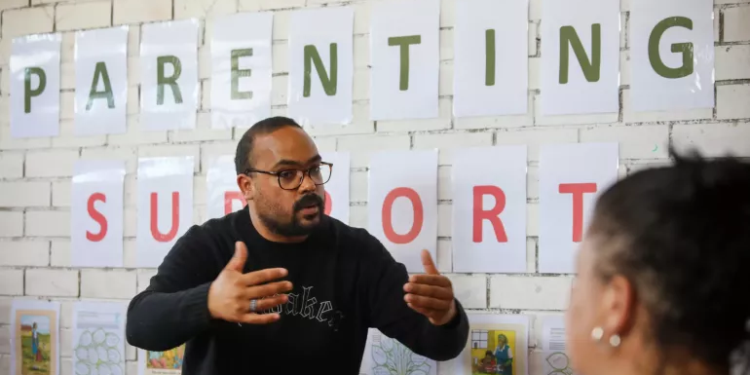By UNICEF
June is Parenting Month, a time to recognize one of the most important (and sometimes most challenging) jobs in the world: Being a parent or caregiver.
At UNICEF, we know that parenting doesn’t come with a manual. Every family is different, every child is unique and every parent deserves support. That’s why we’ve dedicated this special edition of UNICEF Spotlight to celebrate and uplift parents and caregivers everywhere.
Through science-backed advice, expert tips and simple tools for everyday moments, we’re here to help families give their children the best possible start in life and to remind parents that they’re not alone on this journey.
In this award-winning short documentary, Raising Parents, four families from around the world open up about the real moments of parenthood, the joys, the doubts, the everyday challenges and the lessons they’ve learned along the way.
What’s your parenting journey?
Parenting isn’t always easy. But it’s full of unforgettable moments.
We’re collecting parenting wisdom from around the world and invite you to share: What is the most important lesson being a parent/caregiver has taught you? Share here.
Providing your child with love and affection is a pre-requisite for the healthy development of their brain, their self-confidence, capacity to thrive and even their ability to form relationships as they go through life.
You literally cannot give babies ‘too much’ love. There is no such thing as spoiling them by holding them too much or giving them too much attention. When babies are routinely left alone, they think they have been abandoned, and so they become clingier and more insecure when their parents return.
When you notice your child’s needs and respond to them in a loving way, this helps your little one to feel at ease. Feeling safe, seen, soothed and secure increases neuroplasticity, the ability of the brain to change and adapt.
How to bond with your child
Notice what they do. When your baby or young child cries, gestures or babbles, respond appropriately with a hug, eye contact or words. This not only teaches your child that you’re paying attention to them, but it helps to build neural connections in your little one’s brain that support the development of communication and social skills.
Play together. Give them your full attention when you play games together and enjoy seeing the world from your child’s perspective. When you’re enjoying fun moments and laughing together, your body releases endorphins that promote a feeling of well-being for both you and your child.
Hold them close. Your child will feel comforted by your heartbeat and will even get to know your smell. As your child gets a bit older, hugging them can help them learn to regulate their emotions and manage stress. This is because when a child receives a hug, their brain releases oxytocin – the “feel good” chemical – and calms the release of cortisol, the “stress” chemical.
“Parents don’t want to shout or hit their kids. We do it because we’re stressed and don’t see another way,” says Lucie Cluver, Oxford University Professor and mother of two young boys.
We spoke with Professor Cluver about how positive discipline can help teach skills like responsibility, cooperation and self-discipline.
The evidence is clear: Repeated shouting and hitting can adversely impact a child’s entire life. The continued “toxic stress” it creates can lead to a host of negative outcomes like higher chances of school dropout, depression, drug use, suicide and heart disease.
“It’s like saying: here’s this medicine, it’s not going to help you and it’s going to make you sick,” says Professor Cluver. “When we know something doesn’t work, that’s a pretty good reason to look for a different approach.”
Rather than punishment and what not to do, the positive discipline approach puts an emphasis on developing a healthy relationship with your child and setting expectations around behaviour. The good news for every parent is it works and here’s how you can start putting it into practice:
Plan 1-on-1 time: “It can be 20 minutes a day. Or even 5 minutes. You can combine it with something like washing dishes together while you sing a song or chatting while you’re hanging out the washing,” says Professor Cluver. “What’s really important is that you focus on your child. So, you turn your TV off, you turn your phone off, you get to their level and it’s you and them.”
Praise the positives: “Watch out for when they’re doing something good and praise them, even if that thing is just playing for five minutes with their sibling,” recommends Professor Cluver. “This can encourage good behaviour and reduce the need for discipline.”
Set clear expectations: “Telling your child exactly what you want them to do is much more effective than telling them what not to do,” says Professor Cluver. “When you ask a child to not make a mess, or to be good, they don’t necessarily understand what they’re required to do.” Clear instructions like “Please pick up all of your toys and put them in the box” set a clear expectation and increase the likelihood that they’ll do what you’re asking.
“But it’s important to set realistic expectations. Asking them to stay quiet for a whole day may not be as manageable as asking for 10 minutes of quiet time while you have a phone call,” says Professor Cluver. “You know what your child is capable of. But if you ask for the impossible, they are going to fail.”









